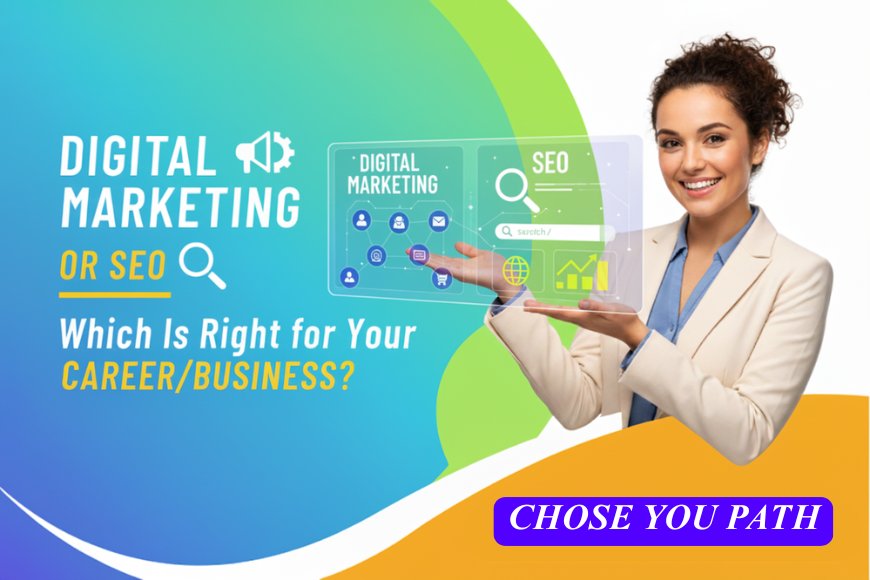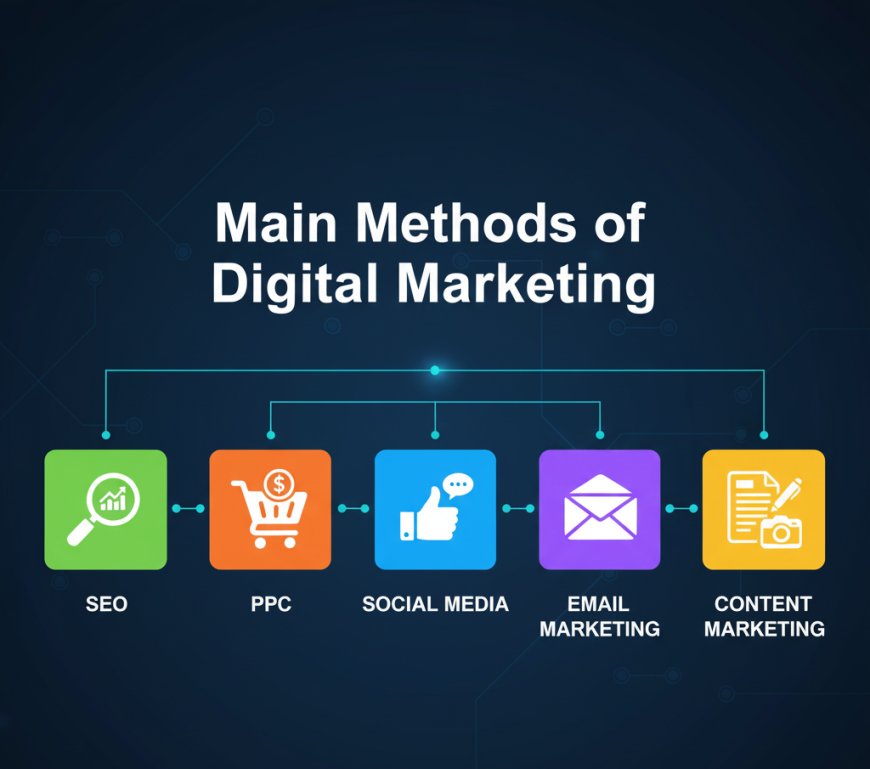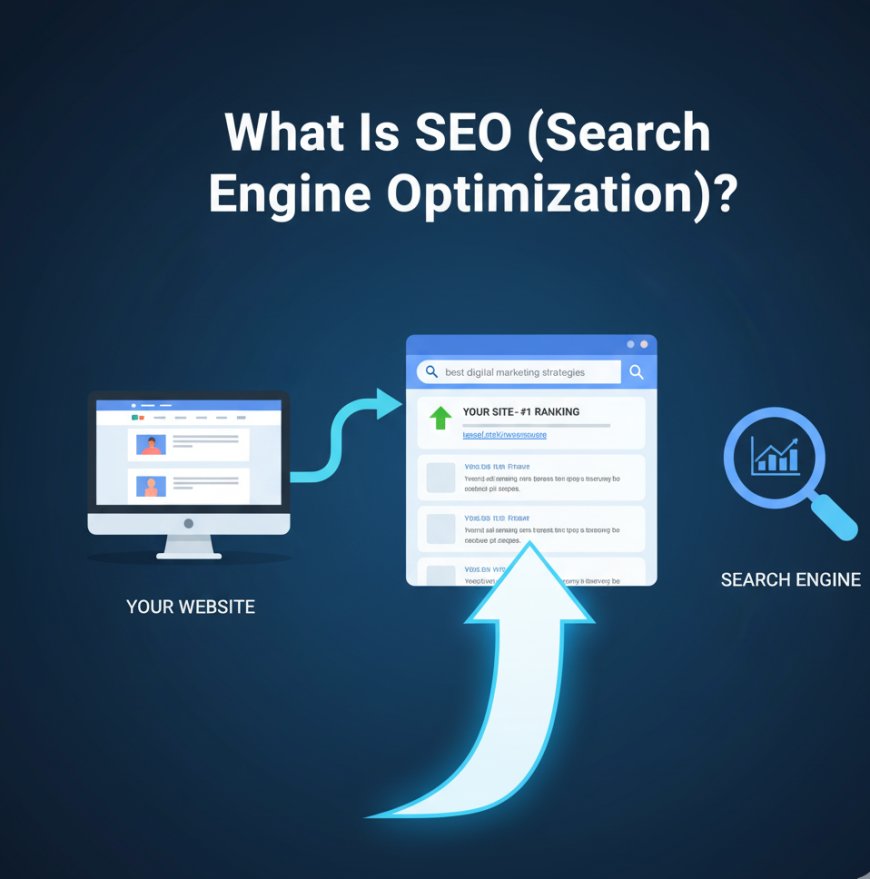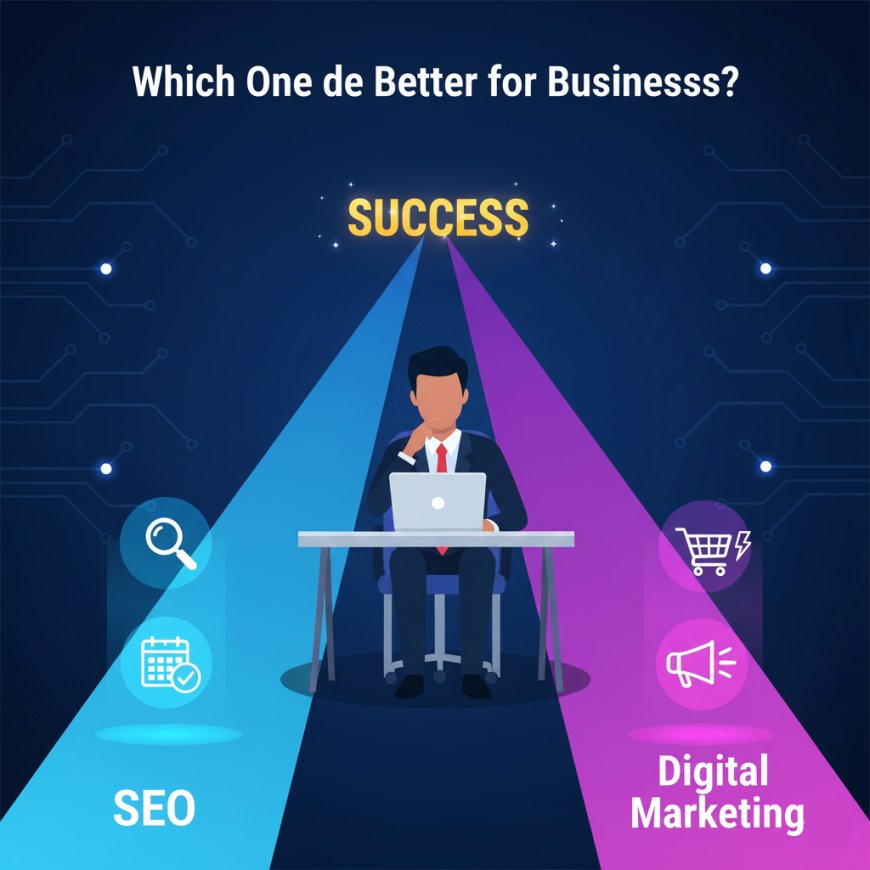Digital Marketing or SEO Which Is Right for Your Career Business?
Discover the key differences between digital marketing and SEO for your career or business. Learn which strategy brings faster results, sustainable growth, and high ROI. Explore career opportunities, strategies, and best practices for both digital marketing and SEO.

In the world of online business, every company faces the same challenge: how to reach customers and keep growing. Two common methods for this are digital marketing and search engine optimization (SEO). Both help improve visibility and create an online presence, but they work in different ways. This raises an important question: which one is better for your needs?
This is a detailed guide, and we will explore what SEO and digital marketing entail, along with their respective advantages and disadvantages, to help you make an informed choice for your business.
Jump to section:
What Is Digital Marketing?
Digital marketing has become an essential component of modern business strategies, leveraging online platforms to connect with consumers. As technology continues to evolve, the methods and tools available for digital marketing have expanded, creating a dynamic landscape for marketers.
This article delves into the various aspects of digital marketing, its significance, types, challenges, and how individuals can equip themselves for success in this field.
Digital marketing is all about promoting products, services, or brands using online channels. This includes websites, social media, email, and paid advertising to reach your target audience wherever they are online.
A digital marketing strategy allows you to leverage different digital channels – such as social media, pay-per-click, search engine optimization, and email marketing – to connect with existing customers and individuals interested in your products or services. As a result, you can build a brand, provide a great customer experience, bring in potential customers, and more.

Main Methods:
- SEO: Helps your website appear higher in search results to attract free organic traffic.
- PPC (Pay-Per-Click): Paid ads that give fast visibility.
- Social Media Marketing: Engaging with people on platforms like Facebook, Instagram, and LinkedIn.
- Email Marketing: Sending direct messages to inform or promote to your customers.
- Content Marketing: Creating blogs, videos, or graphics to educate and attract your audience.
Pros:
- Reach a wide audience
- Measurable results
- Cost-effective
- Targeted audience
- Fast results with paid ads
Cons:
- Platforms change often
- Highly competitive
- People may ignore ads
- Constant data monitoring needed
- Online security risks
What Is SEO (Search Engine Optimization)?

SEO stands for Search Engine Optimization and helps search engines understand your website’s content and connect it with users by delivering relevant, valuable results based on their search queries.
The goal of SEO is to rank on the first page of search engine results pages (SERPs) for the most relevant and valuable keywords to your target demographic, driving qualified traffic to your site.
SEO focuses on improving your website so that it ranks higher on search engines like Google. It brings free, targeted visitors and builds credibility over time.
Search engines help people find what they’re looking for online. Whether researching a product, looking for a restaurant, or booking a vacation, search engines are a common starting point when you need information. For business owners, they offer a valuable opportunity to direct relevant and qualified traffic to your website.
How SEO Works:
Are you at the start of your Search Engine Optimization (SEO) journey? Maybe you’ve heard that SEO can help drive traffic to your website and get you higher rankings by knowing how search engines work.
It is important to understand that the way search engines crawl and rank content is constantly changing, so SEO experts have to regularly update and refresh their tactics to keep their content and websites relevant. This is also what makes SEO so important — an organization that wants high SERP rankings to increase their traffic needs to implement the most effective SEO strategies, such as:
- Focus on user experience
- Implement non-manipulative ranking tactics
- Understand searcher intent/behavior
- Monitor the latest search engine algorithms
- On-page SEO: Optimizing content, titles, and keywords on your website
- Off-page SEO: Building links and improving reputation online
- Technical SEO: Enhancing speed, mobile usability, and security
Pros:
- Long-lasting results
- Builds trust and authority
- Free, organic traffic
- Improves user experience
- High ROI over time
Cons:
- Takes time to show results
- Needs regular attention
- No guaranteed top ranking
- Can be technical
- Initial costs may apply
Key Differences Between SEO and Digital Marketing
| Feature | SEO | Digital Marketing |
|---|---|---|
| Scope | Focus on search engines | Covers many online channels |
| Cost | Mostly time and effort | May require ad spending |
| Speed of results | Long-term results | Can be quick with ads |
Which One Is Better for Businesses?

When to Focus on SEO:
- You want steady, long-term traffic
- Limited budget for ads
- Focus on credibility and authority
When to Focus on Digital Marketing:
- Immediate leads or sales needed
- Promoting on multiple platforms
- Budget available for paid campaigns
Best Approach:
Use both together. **SEO** builds a strong foundation, while **digital marketing** helps get quick results and wider reach.
Which One Should You Learn?
SEO Careers:
SEO Specialist
SEO Analyst
Content Creator (SEO-focused)
Technical SEO Expert
Digital Marketing Careers:
Digital Marketing Manager
Social Media Manager
PPC Specialist
Email Marketing Specialist
Content Marketing Strategist
Growth Hacker
Why Both Skills Are Important:
Understanding both allows you to handle long-term organic growth and immediate marketing campaigns. This makes you highly valuable to businesses.
Final Verdict:
**SEO** = Long-Term Strategy: Builds organic traffic, credibility, and a solid online foundation.
**Digital Marketing** = Quick Growth + Paid Wins: Expands reach, drives fast sales, and complements SEO.
Best Path: **Learn SEO first**, then expand into digital marketing for complete online expertise.







